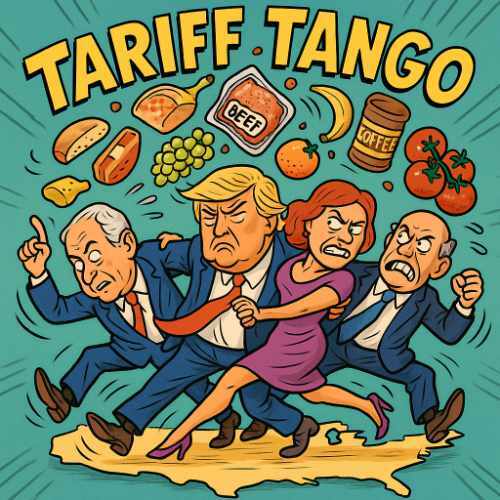Tariff Tango: The Great Grocery Reversal
Washington’s favorite national pastime—the Tariff Tango—is back in full swing inside the opulent Trump Ballroom, a gilded stage built for grand entrances, sudden pirouettes, and the occasional “I definitely meant to do that” recovery. Politicians strut in with tariff bravado, stomp squarely on the price of groceries, then glide backward with the feline nonchalance of a cat pretending it didn’t just hurl the fruit bowl across the room.
On November 14, 2025, the president signed an executive order that quietly, retroactively, and with the timing of a sitcom punchline, rolled back tariffs on more than 200 food items America can’t grow at home. Coffee, beef, bananas, communion wafers, avocados, cocoa, mangoes, coconuts, tomatoes—the whole tropical orchestra. Even the Lord’s supper gets a discount. Nothing says strategic humility quite like sparing spiritual carbohydrates from the crossfire of global trade.
Shoppers have been screaming for months, receipts clutched like courtroom exhibits. Ground beef is up 13 percent year-over-year, steaks 17 percent, roasted coffee beans a staggering 19 percent, bananas 7 percent, tomatoes a modest 1 percent. Avocados rose 5 percent—guac grief in real time—while cocoa drove chocolate prices into the stratosphere, with premium bars surging as much as 30 percent. Mangoes and coconuts crept up 3 to 6 percent. Overall, food at home climbed 2.7 percent, and no one needed an economist to notice; just a cart, a calculator, and a pulse.
Chocolate, in particular, became 2025’s horror story. Global cocoa prices tripled in 2024, rocketing from $3,500 to over $12,000 per metric ton thanks to drought, disease, and aging trees in Ivory Coast and Ghana, which supply 70 percent of the world’s beans. Then came April’s blanket 10 percent tariff, with reciprocal spikes up to 25 percent on key suppliers. Importers paid. You paid more. Hershey alone projected $160 to $170 million in tariff hits. A small Michigan chocolatier saw one shipment jump 26 percent. By summer, experts warned a plain candy bar could hit seven to ten dollars. Halloween sales reached a record $3.9 billion, but volume plummeted 21 percent as families swapped Snickers for sour gummies or skipped the aisle entirely. Manufacturers shrank bars—“fun size” became “micro misery”—or pivoted to cheaper treats. Chocolate wasn’t a guilty pleasure anymore; it was a 401(k) withdrawal.
Then came the rescue. The November 14 order yanked tariffs off cocoa, coffee, tropical fruits, and beef, calling it “common sense” for things we can’t produce domestically. Markets sniffed relief early: cocoa futures dropped 3.6 percent to a 1.75-year low, buoyed by whispers of exemptions and stronger-than-expected West African harvests. Analysts now expect import costs to ease 5 to 10 percent by early 2026, with shelf prices following by spring—maybe. Cocoa remains double pre-pandemic levels at around $5,300 a ton, and holiday stockpiles won’t feel the dip until Easter bunnies hop in.
The rollback rides alongside new framework trade deals with Argentina, Ecuador, Guatemala, and El Salvador, promising to phase out tariffs on staple imports. The administration calls it reciprocal trade—Washington-speak for “sounds fair, details later.” Good news for fruit salads, java junkies, and smoothie enthusiasts. Less so for distillers, still fully tariffed; a stiff Scotch remains the most honest way to process supply-chain spaghetti.
Democrats, naturally, pounced, decrying the administration’s inflationary arson. Fair—but it’s like firefighters arguing over who forgot the hose while the house smolders. Neither party has gripped food affordability with any sustained resolve, flitting from crisis to crisis like hyperactive squirrels in a nut factory, loud and enthusiastic but rarely finishing what they start.
Consumers, battle-weary after a year of vanished “tariff dividends,” tangled logistics, and exemption-list lobbying, greet the news with a weary eye-roll. Modest relief from cheaper coffee, beef, and chocolate is welcome, but it’s a Band-Aid on a decades-old wound: policymaking that’s more reactive twitch than disciplined strategy. Inflation gets treated like bad weather—inevitable, blameless, always the other guy’s storm.
The core demand remains simple: groceries people can afford and leaders who can focus beyond the next news cycle. Until trade policy stops resembling a hormonal mood board, the Tariff Tango will keep spinning—expensive, erratic, and performed by elites whose baristas shield them from the sting of a six-dollar latte.
 News Staff
News Staff![]() -
-
Family & Home
Tariff Tango
Food Prices
-
696 views -
0 Comments -
0 Likes -
0 Reviews
-
-
Family & Home
Tariff Tango
Food Prices
-
696 views -
0 Comments -
0 Likes -
0 Reviews
